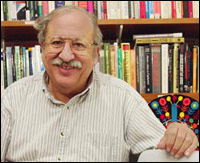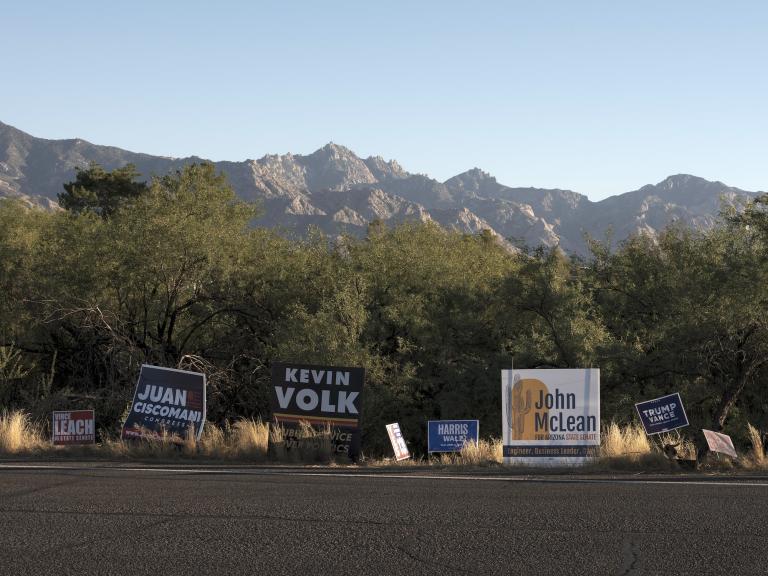Most of us can probably name a grandfather or great-aunt who was active in a chapter of a national association. My own uncle was a member of the Benevolent and Protective Order of Elks. Yet how many of us can say the same about ourselves?

Marshall Ganz.
Photo: Harvard University/Justin Ide.
As voluntary associations fade from our cultural landscape, political participation is threatened, especially on the left, says sociologist Marshall Ganz. And, he says, that trend is undermining the environmental movement, which has long depended on engaged members to carry its banner. That’s why Sierra Club leaders recently turned to Ganz to figure out how to get people fired up again.
In 1964, Ganz dropped out of Harvard to become a civil-rights organizer in Mississippi. The next year, he returned to California, where he had grown up the son of a rabbi and a teacher, to work for Cesar Chavez’s United Farm Workers, eventually becoming the director of organizing. In 1991, after years of union, electoral, and community organizing work, he returned to Harvard to finish his undergraduate degree. And he’s been there ever since: a Ph.D. in sociology in 2000 led to Ganz’s current position as a lecturer in public policy at Harvard’s Kennedy School of Government.
His background led Ganz to the study of social movements, and the ways in which leadership and direction are nurtured. Now he focuses on finding ways to revitalize democratic organizations, develop their leadership, and engage their members — work that he says is critical to rebuilding a base of political power on the left. To that end, he has worked with the Howard Dean campaign and the national Democratic Party, as well as in local campaigns around the country. His just-completed, two-year project for the Sierra Club examined the group’s organizational effectiveness, pointing the way toward energizing its 750,000 members as the core of a revitalized environmental movement.
This fall, the largest-ever meeting of Sierra Club members convened in San Francisco as a way to begin the club’s revitalization. Grist caught up with Ganz after that gathering.
Much of your work has looked at social organizations that sound a little quaint in an age of online connectivity — the Loyal Order of Moose comes to mind. What did those organizations provide that’s lacking today?
Traditionally, membership associations, volunteer organizations, and advocacy organizations provided connective tissue between citizens and government, and public policy in general. There’s been a substantial breakdown in that over the last 30 or 40 years, and it’s left a vacuum.
What’s replaced the traditional organizations are these mailing-list operations — Greenpeace, Children’s Defense Fund, things like that. They’re like advocacy firms, where there’s a few professionals [who] do lobbying, but they don’t really have any kind of mobilizing capacity. They don’t provide vehicles for broad participation.
In these groups it’s very easy to disappear into an elitist mentality where, “Oh, everybody out there is dumb, so we gotta get with people like us and figure out the smart thing, blah blah blah.” Well, that’s deadly to a democratic movement that needs to be figuring out how to engage the broad community.
What’s missing is the link between them and groups that actually get people engaged. That process traditionally had a couple of important features: one was that it linked local with state with national; and secondly it brought people together and trained and developed leadership.
The word leadership figures heavily in your work. What do you mean when you use it?
Leadership is not just someone giving a good speech. Leaders are people actually capable of mobilizing other people and getting them engaged in public life and public action. Participation isn’t just a million individuals making individual choices: it’s a social activity in which some people take responsibility to mobilize others.
This may sound simplistic, but leadership means knowing how to have a good meeting: how to hear all sides, how to make a decision, how to include different points of view. It’s not a particularly mysterious skill set, but if people haven’t been trained in it, or they’ve only learned it as individuals and not as a group, then they don’t know how to do it.
In San Francisco, at the Sierra Summit, you said that “grassroots organizing is about building power.” What does that mean?
Well, the traditional formulation is that there’s two kinds of resources that can yield power: money and people. Democracy is a way to balance money with people. And for that to work, people have got to act together, because it’s through collective power that people can challenge the economic power of private wealth. So the goal is the power to alter policy, to alter circumstances, to change the world around you. It’s not just, you know, come to a nice meeting or something.
And the best way to reach that goal is through membership organizations?
Power is built in collective capacities — the capacity to act together. But that requires mastering the skills of collective action. And for years those skills were taught by large voluntary associations. But it’s sort of fallen into atrophy, and that’s actually where a lot of the Sierra Club groups and chapters are struggling. It’s not just that they’re trying to make better strategy, but they need to be able to mobilize their numbers.
That sounds like the kind of strength we’ve seen more of on the right than the left.
Well, [the right has] more successfully sustained the local/national linkage. We’ve seen that in election after election: they are able to put together local mobilization with national strategy in a way that has worked very well for them. National Right to Life, or the Christian Coalition as it used to be, or the NRA — those are national organizations that actually have local bases, and that actually mobilize them.
The right has this pre-existing base of church organizations. Isn’t that a big part of it?
That’s right, and they seem much more comfortable with a populist political style. They seem much more to “get it” about … being committed and cooperating with other committed people, and going out and evangelizing more. There is an evangelic spirit in their movement that is a great strength to them.
Church-based organizing has also been effective on the left: civil rights-era black churches produced some of the greatest leaders in American history. But they were having weekly meetings of their congregations. Is there anything with that kind of regularity in the environmental movement or in liberal society in general right now?
No, but what’s interesting is that people who came together weekly came together to worship, right? And worship was a collective activity. They weren’t coming together to do something that they could have done individually.
That’s why the Sierra Club’s recreational side is a tremendous strength. Because people come together to do that stuff, and they need to come together in order to do it. It gives the organization a reason to exist aside from getting together and figuring out what to do about public policy.
What do you see as promising sources for leadership on the left? Where do people get it?
I think if the Sierra Club buys into [the idea that it can be an incubator for leadership] it can have a huge impact on the environmental movement. Unions are [also] very important, the SEIU [Service Employees International Union] in particular, and a reenergized labor movement could really help with this. There’s a lot of activity in new immigrant communities — they’re much friendlier to this kind of approach and have had more success with it. Churches have a lot of experience in working in the way that I’m describing. That’s mainly benefited the right; it could benefit the left.
Conspicuously absent from that list are political parties.
Well, the logical thing would be political parties, and in any other industrial democracy it would be a political party. But we have such a screwy electoral system … political parties have become marketing instruments: it’s all about polling and about message and message delivery. There’s really no investment in, interest in, or even understanding of organization building. In the 2004 election, even ACT [America Coming Together] and the other groups were all canvassing operations, which is simply a way of marketing person-to-person as opposed to marketing over the phone. But actually creating collective capacity, organizing groups, developing leadership, and creating organizational capacity? That wasn’t happening — that’s what was missing.
Talk of organization often seems to have a corporate model as the underlying mind-set. It’s common to see MBAs coming into an advocacy situation trying to apply those skills. Is that part of the problem?
I think it’s a huge problem. For many years, the model of large organization in America was representative organization. Then, toward the end of the 19th century, corporate organization became an alternate model. One was about representation, the other was about control.
So now, as the interests and constituencies represented by large organizations like unions have been losing ground, and as this whole market thing has come to be so dominant since Reagan, and public institutions themselves have been increasingly viewed as illegitimate, everybody says, “Well, we gotta do everything like the private sector; we have to do everything like the market.”
It means that creative, intelligent individuals can legitimate a way of operating that doesn’t require them to engage with a constituency, to educate, to lead, to bring people together — to do the kinds of things that people used to have to do to earn leadership in a large organization. It lends itself to a very elitist approach to social change.
Yeah, I’ve noticed a lot of executive directors recently calling themselves CEOs.
Oh yeah. They call them CEOs, they have marketing plans. See, the language is a real giveaway: the language expresses an understanding of how organizations work that makes them basically a question of command and control. And so you wind up with this pull to make advocacy groups look more and more like firms: with boards of directors, managers, efficiency tests, and so forth — not as inclusive, mobilizing social movements or democratic organizations, which is a really different proposition.
What do you make of the demographic overlap between the corporate and environmental worlds? Environmentalists are often typecast as middle-class and white, just like the people who run corporations.
To me that’s one of the great potentials of the environmental movement. It is a middle-class constituency that is committed to a set of values that are not market-driven. It’s a set of values that requires strong public action in order to protect common interests and the common good. The movement plays a very important role in which middle-class, educated people are challenged to turn their values into political action and community action.
A lot of Grist readers — and writers — are the classic sort of environmentalists who recycle and have compact fluorescents and that sort of thing. They’re very on top of the consumer end of environmentalism. So do they need to plug into this organizational end?
Is living your life in an individually responsible way enough to bring about the kind of change that you would hope for? I think the answer is no. It takes collective action. It takes mastering the tools of power, because there are very powerful institutions committed to making your preferred way of life impossible.

